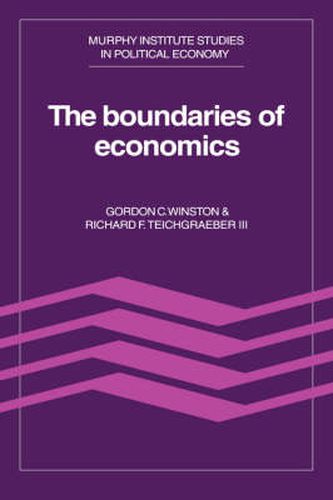Readings Newsletter
Become a Readings Member to make your shopping experience even easier.
Sign in or sign up for free!
You’re not far away from qualifying for FREE standard shipping within Australia
You’ve qualified for FREE standard shipping within Australia
The cart is loading…






This volume examines themes that complicate the conventional economist’s view of the world and thereby provide for a notably more complex, and humane, subject of study than the traditional Homo economicus. Written by economists and philosophers, these essays attempt to place neoclassical economic theory, especially conventional textbook micro-economic theory, in the broader context of other social sciences and modern economics. In doing so, the book aims to find the boundaries of economics and to define more sharply its relationship to other kinds of inquiry. Though the widespread use of textbook microtheory in business, economic, and political analysis is a clear testament to its power, the restrictions and artificialities of neoclassical assumptions give cause for worry even to many economists. This book examines the extent to which the economist’s paradigm - that man is characterized chiefly by self-interested goals and rational choice of means - is useful in studying traditional noneconomic fields such as philosophy, political theory, and rhetoric. It also looks at how insights from other disciplines are changing - and perhaps improving - the current practic of economics.
$9.00 standard shipping within Australia
FREE standard shipping within Australia for orders over $100.00
Express & International shipping calculated at checkout
This volume examines themes that complicate the conventional economist’s view of the world and thereby provide for a notably more complex, and humane, subject of study than the traditional Homo economicus. Written by economists and philosophers, these essays attempt to place neoclassical economic theory, especially conventional textbook micro-economic theory, in the broader context of other social sciences and modern economics. In doing so, the book aims to find the boundaries of economics and to define more sharply its relationship to other kinds of inquiry. Though the widespread use of textbook microtheory in business, economic, and political analysis is a clear testament to its power, the restrictions and artificialities of neoclassical assumptions give cause for worry even to many economists. This book examines the extent to which the economist’s paradigm - that man is characterized chiefly by self-interested goals and rational choice of means - is useful in studying traditional noneconomic fields such as philosophy, political theory, and rhetoric. It also looks at how insights from other disciplines are changing - and perhaps improving - the current practic of economics.